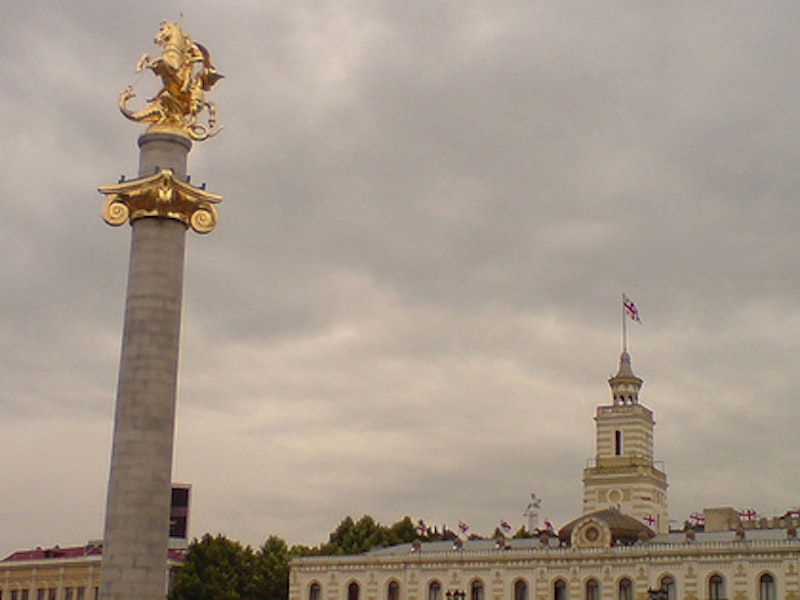When the Berlin Wall fell 1989, presaging the imminent collapse of the Soviet Union and the Communist regime, political economist Francis Fukuyama wrote that we were witnessing the “End of History”—a period in which we would see triumph over authoritarianism and the universalization of liberal democracy as man’s final form of government. Today, in the current crisis between Georgia and Russia, it seems we are witnessing the “Return of History.”
Three years ago, I traveled to Tbilisi, Georgia to work for that country’s premiere policy research center as they prepared to build upon the achievements of the Rose Revolution, the famous 2003 American-backed uprising that inspired popular revolts across the former Soviet Union. What I saw there was a nation of people who, for the first time in their lives, were excited about their future and the direction their country was heading.
Not all was well, however. When the Georgian people ousted their corrupt, undemocratic leaders with Western aid and replaced them with those who respected democracy and the rule of law, Russia interpreted it as a direct threat to their regional power and immediately sought to undermine Western influence. Moscow was particularly worried about the rise of Georgian President Mikheil Saakashvili, a charismatic, pro-American lawyer, who promised to restore his country’s democratic institutions and ensure its independence from Russia.
Russia’s invasion of Georgia this month is perhaps their most brazen attempt to undermine the progress achieved by Georgia’s pro-Western leadership. On the false pretext that he was merely “liberating” Russian citizens in South Ossetia and Abkhazia—a pretext akin to Hitler’s justification for invading Czechoslovakia—Russian Prime Minister Vladimir Putin ordered Russian military forces to invade Georgia and, it is suspected, remove Saakashvili.
In short order, Russia violated Georgia’s sovereignty, indiscriminately bombed civilian targets, and repeatedly violated a cease-fire agreement brokered by French President Nicolas Sarkozy. Tellingly, one of Russia’s primary targets was the new Baku-Tbilisi-Ceyhan oil pipeline, a major energy corridor that will reduce Europe’s dependence on Russian oil. Russia has done all of this in spite of international condemnation, once again demonstrating the impotence of the United Nations to effectively deal with crisis.
In its entirety, this aggression against Georgia represents part of an ongoing Russian effort to undermine democratic values in the former Soviet Union and alter the international balance of power by reconstituting the Russian empire. In between describing the collapse of the Soviet Union as “the greatest catastrophe of the 20th century” and claiming the North Pole as Russian territory, Putin has seized near-total power by circumventing the Russian constitution, enabling the systematic murder of journalists investigating government abuses, eliminating independent news media, imprisoning political opponents, and funding insurgent forces in Western-oriented nations.
This is not the first time Moscow has sought to control Georgia. In an August much like this in 1924, while the rest of the world had just finished watching the summer Olympic Games, Georgians united in what is known as the “August Uprising” to fight the forced integration of their country into the Soviet Union. Outmatched by a much bigger and stronger Red Army, Georgia appealed to the League of Nations for help. Those appeals were met with admissions that the League was powerless to act. In 84 years, it appears not much has changed.
The good news is Russia has badly misjudged its own current capacity to maintain such an imperialistic course. Thus, any action we take today has a greater chance of achieving our desired goals than if we waited for them to bolster their power. Fortunately, defending Georgia does not require us to intervene militarily. We have several options available, including expelling Russia from the G8 and expediting the accession of Georgia and Ukraine to NATO, which, if it weren’t for German obstruction of such efforts earlier this year, likely would have prevented the current crisis. Each of these options would weaken Russia internationally and send a clear message that we will not tolerate their aggressions.
Near the end of my stay in Georgia, I was having dinner with my host family and, seemingly out of nowhere, their teenage son asked me, “Joe, do you believe Georgia has a future?” Before I could answer, he said, “I do, because I know America is on our side.”
That sentiment was reinforced the next day as I was walking the main street in Tbilisi and passed a newsstand. One of the newspapers caught my eye: In reference to a commitment we had just renewed to continue aiding Georgia’s transition to democracy, the paper’s top headline screamed “America Saves Georgia…Again!”
In the current crisis, the United States has been forced into a delicate situation that requires us to uphold our moral obligations to our democratic allies. If we are to be respected as a force for democracy, America cannot be a country that demands sacrifice from other nations and then turns their back on those nations when they require our support. Many of our democratic allies depend on our aid for their survival against more powerful, oppressive forces. We can save Georgia again. By doing so, we are saving much more than an ally; we are sending a message to Russia and our allies that we reserve the privilege to use our might in defense of the principles we treasure.
Saving Georgia
"If we are to be respected as a force for democracy, America cannot be a country that demands sacrifice from other nations and then turns their back on those nations when they require our support."

"Golden Tower, Tbilisi" by mortsan
